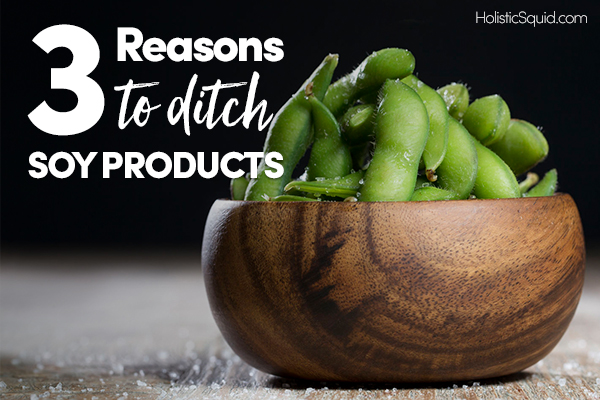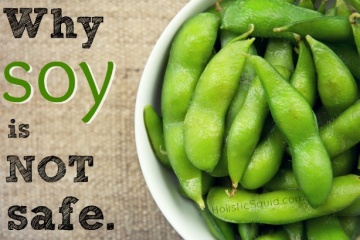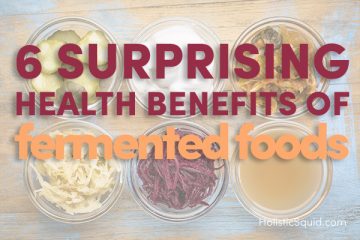

Touted as a miracle food in 90’s, the hype around soy is still alive and well. While soy can be a good source protein for folks avoiding animal-based foods (and fermented soybean is an awesome source of vitamin K2), it also has a long list of reasons why you might want to avoid it. This list includes things like allergies, thyroid problems, PMS, and infertility.
Before you drown your cereal in soy milk, order a soy latte, or snack on a nutrition bar filled with soy protein – keep reading to find out how this “health” food may be doing more harm than good.
#1 – Ditch soy products for happier hormones
Soy contains phytoestrogens, which are plant-based estrogens that mimic natural estrogen. The levels of phytoestrogen in soy are off the charts. So much so, that women going through menopause are encouraged to consume soy products. But as it turns out, even if you feel relief from hot flashes and night sweats, soy also disrupts your body's ability to find hormonal balance. In short, there are other ways to manage signs of dipping hormones related to menopause.
if you’re not a woman battling hot flashes and mood swings, what is the impact phytoestrogens?
- Early onset puberty – Children given soy formula as infants may experience early puberty as compared to their non-soy-guzzling peers. Early puberty is a problem because it exposes the body to sex hormones for a longer period of time that what is normal. For young boys, this means an increased risk of developing testicular cancer as an adult. For girls, early puberty increases the lifetime risk of developing breast cancer, ovarian cysts, and thyroid disease.
- Breast cancer – The consumption of soy products and increased intake of phytoestrogens may be linked to the onset of breast cancer at an early age in women.
- Thyroid issues – Japanese research suggests consuming soybeans may cause hypothyroidism and goiter.
- Male fertility issues – The phytoestrogens present in soy can significantly lower a man’s sperm count which can contribute to infertility.
#2 – Soy can make you itchy and inflamed
According to the Food and Agriculture Organization of the United Nations, soy is one in eight most significant food allergens. Signs of an allergic reaction to soy include hives, a red rash, itchiness in the mouth, nausea or diarrhea, wheezing, and a stuffy or runny nose.
Soy allergy often begins during babyhood, in response to a soy-based formula. Food allergies – like a response to soy – often disappear as a baby’s immune system matures.
Because an allergic response to soy isn’t always immediate, it can be a silent villain. The best way to know if you have a sensitivity to soy it to cut out from your diet and observe how you feel. You can find soy in many foods processed foods, like boxed cereals, meat products, baked goods, and chocolate candy.
#3 – All soy is GMO
The phytoestrogens and other substances in soy foods may be the cause of health risks, but that’s not the only problem.
Since the 1990s, genetically modified soy has been a staple in U.S. food products. The seeds used in these crops are genetically modified in laboratories to enhance desirable traits, such as improved nutritional content, heat resistance, or resistance to herbicides.
While this sounds like it might be good for farmers, GM foods are potentially dangerous to your health. For example, GM soy has been found to get in the way of digestion and increase the risk for allergy.
Take a conservative approach to soy consumption
Feeling alarmed about soy? Take a conservative approach to your soy consumption. Avoid genetically modified soy, eliminate soy where possible (especially for children or those with any immune system weakness or possible hormone imbalance), then enjoy soy foods you love in moderation. Two more things to know:
- Go fermented – Only consume fermented soy products, such as tempeh, miso, natto, and fermented tofu. Fermented soy does not contain the toxins present in non-cultured soy products. Fermentation increases the availability of isoflavones which are associated with cancer prevention, and fermentation produces probiotics, the beneficial bacteria that improves digestion and nutrient absorption in the body.
- Read your labels – Soy is a common ingredient in popular “health” foods and protein supplements. Make sure you know what you’re putting in your mouth to avoid accidentally saucing yourself with soy.












All soy is GMO? Even organic? Is this due to cross-contamination of crops? Isn’t it a requirement that organic be NOT contaminated by GMO. I am aware that this is not possible in all cases, but for soybeans? For alfalfa maybe? Please educate me!
Hey AJ,
Most of the soy grown in the US (around 90 percent) is genetically engineered to withstand herbicides. While less than one percent of soybeans are organic. That said, contamination and “pollen drift” are certainly an issue and impossible to control.
Emily xoxo